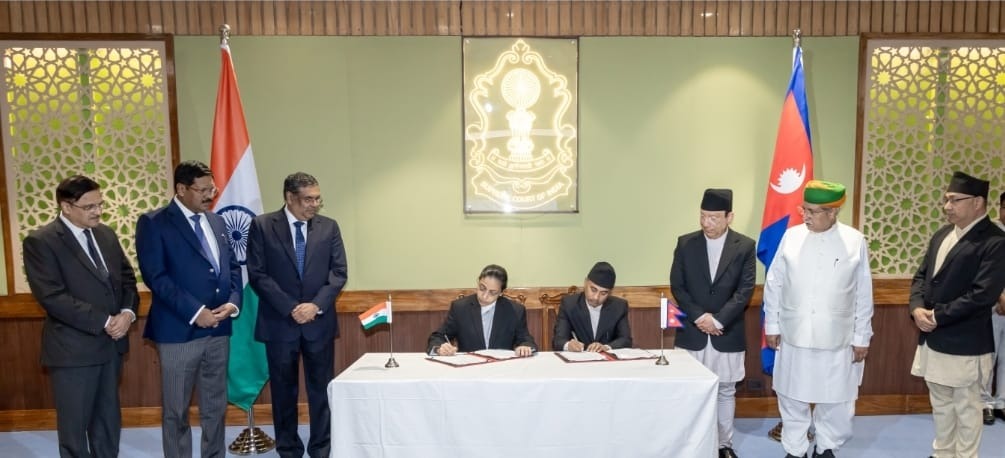India–Nepal Judicial Ties Deepen: Landmark MoU Signed to Accelerate Legal Reforms and Cooperation

The bilateral relationship between India and Nepal, already rich with multi-faceted cooperation, took a historic leap forward today—this time in the judicial sector. A landmark Memorandum of Understanding (MoU) on Judicial Cooperation was signed between the Supreme Court of India and the Supreme Court of Nepal, signaling a new era of collaboration in legal reforms, capacity building, and judicial modernization.
The MoU was signed in New Delhi in the esteemed presence of Hon’ble Chief Justice of India, Justice Sanjiv Khanna, Rt. Hon’ble Chief Justice of Nepal, Justice Prakash Man Singh Raut, and Hon’ble Minister of State (Independent Charge) for Law and Justice, Government of India, Arjun Ram Meghwal.
This institutional agreement aims to further strengthen the already robust judicial partnership between the two countries. It will serve as a foundation for exchange of legal knowledge, capacity enhancement through short-term and long-term training programs, and promote sharing of best practices in judicial processes.
Key Objectives of the MoU:
-
Mutual exchange of information regarding the latest legal and judicial developments.
-
Capacity building of judges and court officials through regular training programs, academic interactions, and judicial exchanges.
-
Promotion of digital and technological integration in courts, focusing on streamlining procedures and increasing transparency.
-
Formation of a joint working group composed of representatives from both judiciary systems to plan and execute cooperative programs.
India's Track Record in Judicial Diplomacy
India has already entered into similar judicial cooperation agreements with several countries and institutions, including the Supreme Courts of Israel, Singapore, Bangladesh, Bhutan, and with governments of Tunisia, Zambia, Morocco, and the Maldives. The addition of Nepal to this list reaffirms the growing regional and global recognition of South-South judicial partnerships.
Analytical Insight: Could This MoU Be a Game Changer for Nepal?
Nepal’s judiciary has long grappled with case backlogs, lack of digital infrastructure, and slow adjudication. The collaboration with India—whose judiciary has pioneered several technological innovations like the e-Courts Project, virtual hearings, and AI-based case management tools—could provide the much-needed technical and institutional support to bring about systemic transformation.
If effectively implemented, the MoU could lead to:
-
Faster resolution of cases in Nepal.
-
Improved transparency and public access to justice.
-
Strengthened institutional capacity across Nepal’s judicial hierarchy.
Potential Challenges
While the MoU opens promising avenues, its success will depend on:
-
Institutional readiness and political will within Nepal’s judiciary.
-
Availability of financial and technical resources.
-
Timely implementation of reforms following shared strategies.
Technological adoption, especially, requires legal reforms, localized training, and digital infrastructure development—areas where Nepal needs targeted investment and commitment.
Conclusion
By signing this MoU, Nepal has taken a critical step toward judicial reform and international collaboration. More than a ceremonial gesture, this agreement marks the beginning of a long-term engagement to modernize court systems, deliver timely justice, and build institutional trust.
🧾 Editorial Comment:
This MoU is not just a formal agreement; it’s a strategic opportunity for Nepal to leap forward in judicial excellence. With India’s experience and Nepal’s willingness for reform, this collaboration could very well transform Nepal’s judicial landscape from within—powered by external expertise.




![From Kathmandu to the World: How Excel Students Are Winning Big [Admission Open]](https://nepalaaja.com/img/70194/medium/excel-college-info-eng-nep-2342.jpg)
